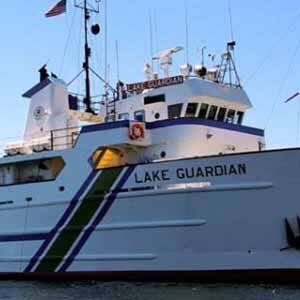The WICCI Great Lakes Working Group includes citizens, private and public decision-makers, and scientists collaborating on climate change’s impacts on the Great Lakes. Our goals are:
- Develop scientific understanding of climate impacts on the Great Lakes
- Identify vulnerability to climate change and climate variability
- Develop resources for adaptation planning and natural resources management
If you would like to join the Great Lakes Working Group or contribute to relevant products, please contact our cochairs, Titus Seilheimer (seilheimer@wisc.edu) or Madeline Magee (madeline.magee@wisconsin.gov). Efforts of the Great Lakes Working Group have been greatly enhanced by the involvement of students. If you’re a student who is interested in getting involved, please reach out to Madeline Magee or Titus Seilheimer.
Summary of Issues and Impacts
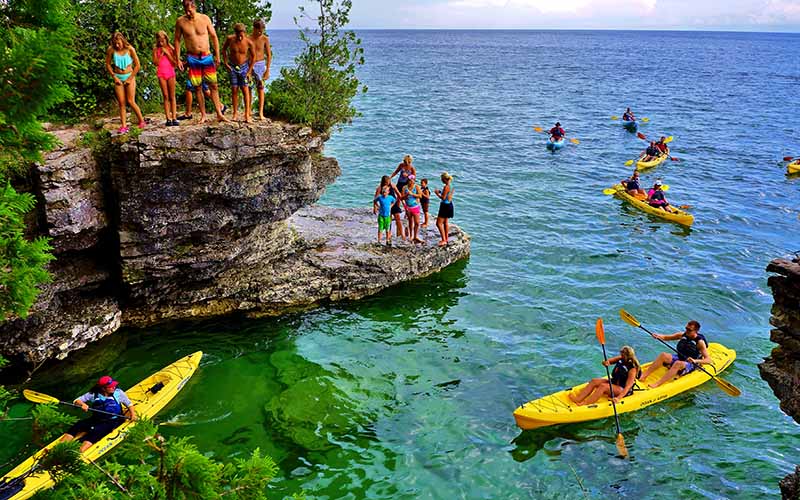
Lake Superior is the largest freshwater lake in the world in terms of surface area and one of the deepest at over 1,300 feet, while Lake Michigan is the sixth largest lake in the world and over 900 feet deep. Both lakes are ecologically and culturally important to the people of Wisconsin and are home to over 3,500 different species of fish and wildlife.
A healthy Great Lakes future requires understanding climate change impacts and the feedback between climate change effects on the Great Lakes and the Great Lakes moderation of regional climate. Climate impacts to the Great Lakes include:
Extreme Rain Events
Extreme rain events increase nutrient loading into the Great Lakes, leading to declines in nearshore water quality, increasing E. coli and other contaminants, and increasing harmful algal blooms.
Explore
Warmer Water Temperatures s
Native Great Lakes species and food webs are stressed by warmer water temperatures and longer growing seasons are impacting food web dynamics. Most at risk are lake whitefish, lake trout, cisco, and brook trout. Warmer water temperatures can also increase spread, success, and impacts of non-local beings (invasive species).
Explore
- News Report: Great Lakes Temperature Extremes Intensifying due to Climate Change
- Study: Indications of a Changing Winter through the Lens of Lake Mixing in Earth’s Largest Freshwater System
- Study: Climate Change-Induced Amplification of Extreme Temperatures in Large Lakes
Fluctuating Water Levels
Lake water level fluctuations include both high and low water level extremes with potentially higher highs and lower lows than in the historical record. These fluctuating lake levels threaten coastal wetlands since natural wetland vegetation is too slow to adapt to the shorter time between high and low water conditions.
Manoomin (wild rice) is highly sensitive to fluctuating lake levels and is particularly vulnerable to climate change. During periods of high water levels, wave action from storm events increases shoreline erosion, damaging or completely destroying sensitive and rare shoreline habitats.
Explore
- Factsheet: Climate Change and Extreme Water Levels (pdf)
- Article: Climate Change is Driving Rapid Shifts between High and Low Water Levels on the Great Lakes
Decreasing Ice Cover
Ice cover is a “master variable” for many large lake processes. Less ice cover leads to increases in summer water temperature, more harmful algal blooms, winter shoreline erosion, and exposure of fish eggs to damaging wave action in winter.
Explore
- Data: Historical Great Lakes Ice Cover
- News Report: Declining Great Lakes Ice Cover
Cumulative Impacts
The cumulative impact of climate changes enhances impacts on the Great Lakes. For example:
- Warmer water temperatures and decreased ice cover exacerbate the impacts of extreme rain events on harmful algal blooms in Green Bay and Lake Superior.
- Decreasing ice cover enhances the impact of warmer water temperatures on cold-water fish species in the Great Lakes.
- Warmer temperatures and increased nutrient runoff during extreme rain events both create ideal conditions for non-local beings (invasive species) to become established and negatively impact native species.
Explore
- WICCI Video: Climate Change Impacts to the Great Lakes
- Video: Climate Change in the Great Lakes (Environment and Climate Change Canada)
- Resource: A Report on Climate Change and Future Needs in Green Bay (pdf)
- Resource: Climate Change and Wisconsin’s Great Lakes Ecosystem Key Points Summary (pdf)
- Resource: Great Lakes Working Group report (pdf)
Recommended Solutions/Strategies
Addressing ongoing climate change will require diverse planning and management approaches. Generally, these strategies fall into four categories: resist change, build resilience, direct change, and accept change.
Resist Change
Resistance strategies protect existing resources to maintain historical conditions. These actions might be effective in the short-term but might not be feasible over the long term as they will require greater resources and effort. These options may be most appropriate for ecosystems with low sensitivity to change or those that have high economic, cultural, or ecological value. Actions include habitat protection and management, increasing invasive species control efforts, and efforts to protect water quality.
Explore
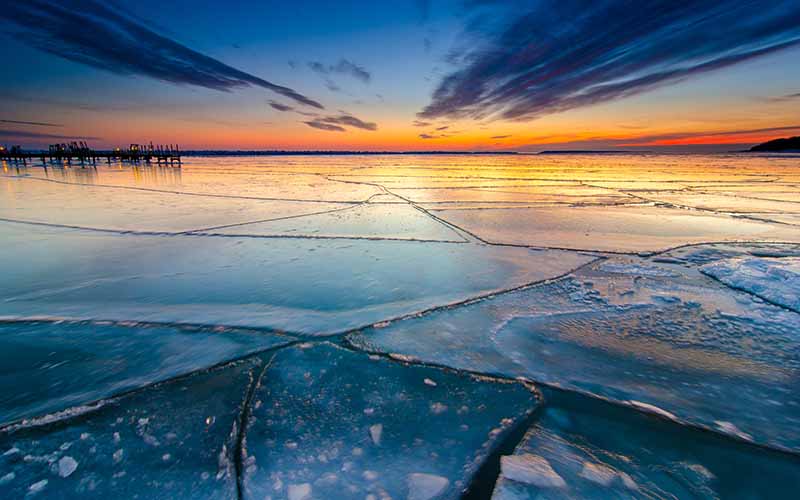
Build Resilience
Resilience strategies reduce stress, minimize vulnerability, and maintain ecosystem function following disturbance. These actions might be most effective in areas that already tolerate a wide range of conditions. Actions include the resistance actions mentioned above and efforts to reduce existing stressors on natural resources, like reducing pollution, reducing fishing pressures, increasing tree canopy shading to keep water cool, and enhancing the ability of the ecosystem to retain water on the landscape.
Explore
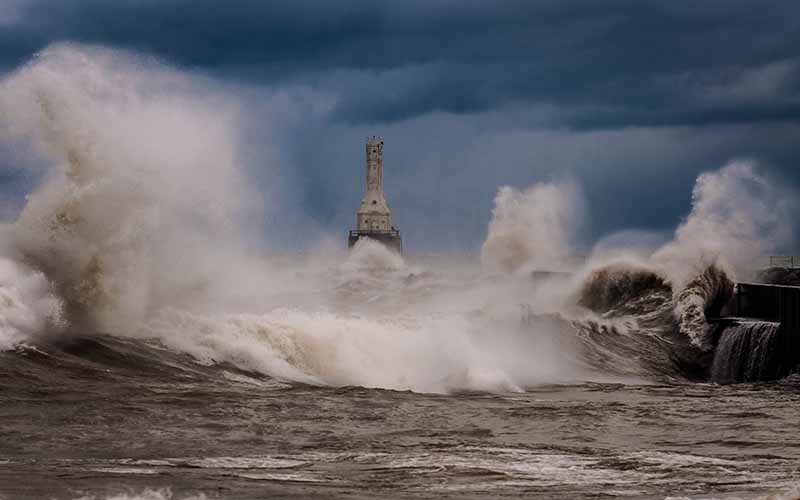
Direct Change
These strategies anticipate ecosystem change and facilitate transformation to a desired new condition. Actions include efforts to facilitate species transitions by conserving and restoring ecological connections to facilitate species migrations.
Explore
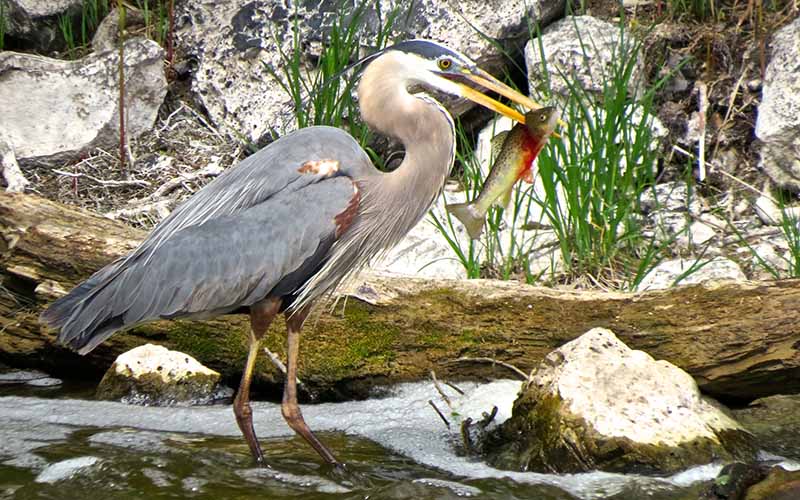
Accept Change
Acceptance strategies allow climate change to cause transformation, and we can respond accordingly as the ecosystem changes. Actions include maintaining ecosystem services through managed efforts like increased fish stocking and beach grooming to reduce pathogens. Monitoring programs to track the impact of climate change also fit in this category.
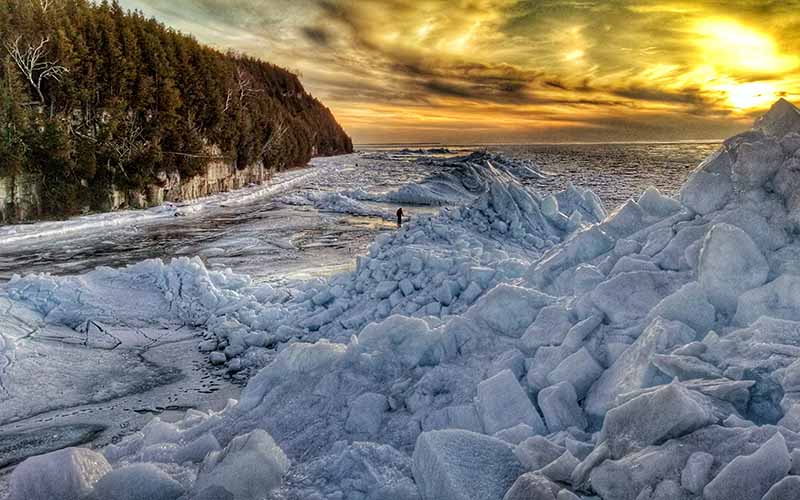
The Great Lakes Working Group explored these solutions further in its report, Climate Change and Wisconsin’s Great Lakes Ecosystem (pdf). Members of the Great Lakes Working Group, along with the Northern Institute of Applied Climate Sciences and collaborators also created the Great Lakes Coastal Adaptation Menu to help resource managers plan and implement climate-informed tactics for the Great Lakes ecosystem.
Explore
- Adaptation Menu: Strategies for Adapting Great Lakes Coastal Ecosystems to Climate Change (pdf)
- Adaptation in Action (Video): Helping Great Lakes Coastal Ecosystems Adapt to Climate Change
- Adaptation in Action (Video): Insights from the Lake Superior Coastal Wetlands Climate Resiliency Study
- Adaptation in Action: Apostle Islands National Lakeshore: Coastal Wetland Vulnerability and Adaptation
Environmental and Climate Justice Issues
The Great Lakes Working Group has begun to explore the environmental and climate justice concerns surrounding the Great Lakes. The working group notes that climate change especially threatens subsistence and cultural fishing rights on the Great Lakes. They call for decision makers to consider how the impacts of climate change stress subsistence fishing and important cultural resources, such as tribal fisheries and wild rice beds.
Stories
Resources
This is an accordion element with a series of buttons that open and close related content panels.
Climate Change Resources
2021 Great Lakes Working Group Report: Climate Change and Wisconsin’s Great Lakes Ecosystem (pdf)
This report aims to assess current and projected impacts of climate change on Wisconsin’s unique Great Lakes ecosystem and provide potential solutions and climate adaptation strategies.
Climate Change and Wisconsin’s Great Lakes Ecosystem Summary (pdf)
This summary document, created by the Great Lakes Working Group, highlights key take-home messages on climate change impacts to Wisconsin’s Great Lakes Ecosystem.
Climate Change and Extreme Water Levels Factsheet (pdf)
Created by the WICCI Great Lakes Working Group, this fact sheet is geared toward a non-technical audience and explains how Great Lakes water levels have been changing and what impact that might have on valuable Lake Michigan and Lake Superior coastal ecosystems.
Climate Change and Harmful Algal Blooms Factsheet (pdf)
Created by the WICCI Great Lakes Working Group, this fact sheet is geared toward a non-technical audience and explains how climate change will impact harmful algal blooms on Wisconsin’s Great Lakes.
Scoping a Research Agenda for the Future of the Green Bay Ecosystem (pdf)
This report, led by WICCI working group members and other collaborators, serves as a comprehensive synthesis of findings derived from community surveys and an expert workshop held in October 2023. The goal is to outline a research agenda addressing the impacts of climate change on the Green Bay ecosystem.
Informing a Climate Change Science Plan for the Green Bay Ecosystem (pdf)
This report summarizes the results from a survey of scientists and interviews with conservation professionals. This work was led by the Natural Resources Institute at UW–Madison Division of Extension.
Climate Change Impacts to the Great Lakes
Video presentation giving an overview of climate change impacts to the Great Lakes. This video covers impacts to physical, chemical, and biological components of the Great Lakes Ecosystems and uses invasive species to describe how climate change impacts can have cumulative impacts to the ecosystem.
Overview of WICCI 2021 Assessment Report
This presentation to the Green Bay Conservation Partners Roundtable highlights findings from the WICCI 2021 Assessment Report.
Climate Change Impacts to Lake Superior
This presentation to the Lake Superior Collaborative describes climate change impacts to Lake Superior.
Solutions Case Study: Slow the Flow (pdf)
This case study describes the “Slow the Flow” concept and details recommendations for Slow the Flow practices in Wisconsin’s Lake Superior Basin.
Solutions Case Study: Nature-Based Solutions at Samuel Myers Park (pdf)
This case study describes the Samuel Myers Park restoration project and how climate informed decisions were used to increase resiliency.
Adaptation Resources
Northern Institute of Applied Climate Sciences (NIACS) developed the Adaptation Workbook and related resources. The workbook enables natural resources professionals to consider the potential effects of climate change and design actions that can help reduce risk and increase the ability to cope with changing conditions.
Strategies for Adapting Great Lakes Coastal Ecosystems to Climate Change (pdf)
Individuals from the WICCI Great Lakes Working Group, Northern Institute of Applied Climate Sciences, and others collaborated to develop a menu of climate adaptation strategies and approaches for Great Lakes coastal ecosystems. This menu can be used along with a structured decision-making framework to facilitate the planning and implementation of climate-informed tactics. The menu was tested with several organizations in project-level planning in the Great Lakes watershed.
Helping Great Lakes Coastal Ecosystems Adapt to Climate Change
This video describes how the Great Lakes Coastal Ecosystem Adaptation Menu was used to design a habitat restoration project in Allouez Bay, Superior, Wisconsin, and offers insights into applying adaptation practices on the ground.
Insights from the Lake Superior Coastal Wetlands Climate Resiliency Study
This recording is of a seminar describing the Lake Superior Coastal Wetlands Climate Resiliency Study. This study created a framework for determining sensitivity, adaptive capacity, and overall resiliency of 38 Lake Superior coastal wetlands. This project was used by resource managers to develop adaptation plans in the basin.
Apostle Islands National Lakeshore: Coastal Wetland Vulnerability and Adaptation
Coastal wetlands on the Apostle Islands National Lakeshore are managed in part for preservation. The team, consisting of WICCI Great Lakes Working Group members, used the Adaptation Workbook and the Great Lakes Coastal Ecosystems Adaptation Menu of strategies and approaches to consider vulnerabilities from climate change and to explore actions that may help managers cope with changes over time.
Adaptation Demonstration: Piping Plover Recovery
Partners from the Bad River Band of Lake Superior Chippewa, Wisconsin Department of Natural Resources, U.S. Fish and Wildlife Service, and Apostle Islands National Lakeshore worked together to incorporate climate change adaptation ideas into population recovery plans for Great Lakes piping plovers.
Solutions Case Study: Natural Flood Management (pdf)
This case study details example actions to increase resilience and resist change with a natural flood management approach in the Lake Superior Basin.
Adaptation Demonstration: Samuel Myers Park Restoration
This storymap details the Samuel Myers Park coastal beach and wetland restoration project in Racine, Wisconsin.
Nature-Based Shoreline Options for the Great Lakes Coasts
This guide describes different types of nature-based shoreline techniques and case studies suitable for the Great Lakes and coastal ecosystems on the Great Lakes.
Other Climate Change Organizations and Projects
Our Team
Stakeholders and Partners
- Wisconsin Department of Natural Resources
- University of Wisconsin Aquatic Sciences Center
- USGS
- Lake Superior NERR
- Northland College
- University of Wisconsin–Milwaukee, School of Freshwater Sciences
- University of Wisconsin–Green Bay
- NewWater
Contact Information
- Madeline Magee (co-chair), Monitoring Program Coordinator, Wisconsin Department of Natural Resources, madeline.magee@wisconsin.gov
- Titus Seilheimer (co-chair), Fisheries Specialist, University of Wisconsin Aquatic Sciences Center, seilheimer@wisc.edu


